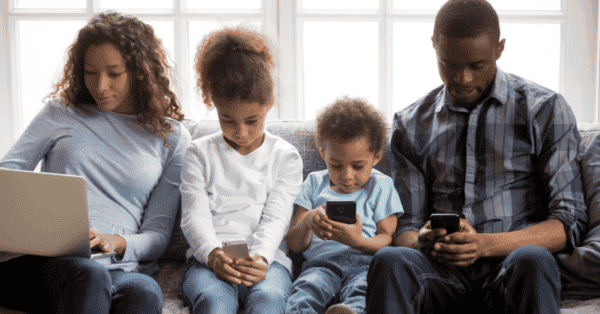How can I spot when my child has had ‘too much’ screen time?
De la postura original de la Academia Estadounidense de Pediatría (1999) que indica que no hay tiempo de pantalla para niños menores de dos años, luego se actualiza a un enfoque más matizado (2016) al permitir contenido de alta calidad para niños, ahora sabemos que todo el tiempo de pantalla no es igual.
The Royal College of Pediatrics and Child Health suggest that parents approach screen time “based on the child’s developmental age, the individual need and value the family place on positive activities such as socialising, exercise and sleep.”
Este consejo bien intencionado para las familias alivia las preocupaciones (y la culpa) con respecto a las actividades basadas en la pantalla, demuestra el impacto positivo de la tecnología y permite a los padres centrarse en el contexto y el contenido del tiempo frente a la pantalla en lugar de limitarse a los límites de tiempo.
But some parents and carers may still want to know: “when has my child had ‘too much’ screen time?”
As families and children differ, so does the effects of screen time. However, all parents can use these tips as a guideline.
Observe cómo interactúa su hijo con su dispositivo
- ¿Tiene mi hijo un berrinche cuando se quita el dispositivo o se apaga la pantalla?
- ¿Mi hijo se queja de dolor de cuello o dolor de espalda?
- ¿Mi hijo se queja de dolores de cabeza o fatiga visual?
- ¿Mi hijo se vuelve agresivo o enojado cuando juega o mira en línea?
- ¿Mi hijo a menudo parece sobreexcitado?
- ¿Mi hijo se ha vuelto desorganizado, desobediente u opositor?
Si la respuesta a la mayoría de estas preguntas es 'Sí', entonces los padres deberían considerar complementar las actividades del tiempo de pantalla con otra cosa.
Recognise when screen time negatively impacts children’s development
- ¿Mi hijo se conecta socialmente con familiares y amigos?
- ¿Está mi hijo físicamente sano y duerme lo suficiente?
- ¿Está mi hijo comprometido y tiene éxito en la escuela?
- ¿Mi hijo persigue intereses y pasatiempos (en cualquier forma)?
- ¿Se está divirtiendo y aprendiendo mi hijo en su uso de los medios digitales?
If the answer to the majority of these questions is ‘No’, then parents may need to place limits on screen-based activities.
See more ways to manage screen time and tackle ‘too much’ of it.


